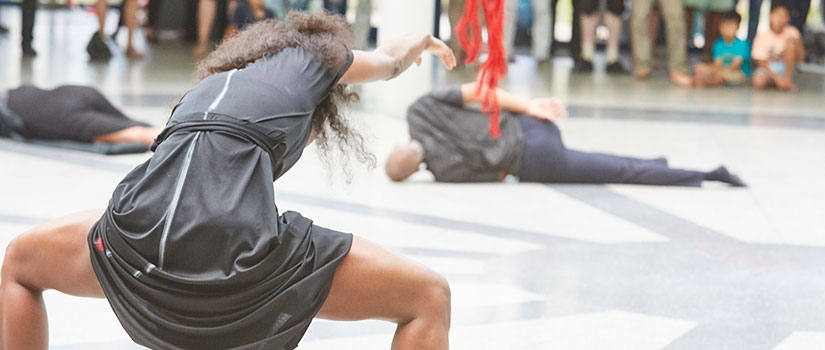Associate Professors Tanya Wideman-Davis and Thaddeus Davis were awarded a National Dance Project grant from the New England Foundation for the Arts (NEFA) in July, 2018. The grant funds development of their new work, Migratuse Ataraxia, for which they received a University of SC Provost's Grant in 2017. The work has also been supported by the New England Foundation for the Arts' National Dance Project, with lead funding from the Doris Duke Charitable Foundation and The Andrew W. Mellon Foundation, as well as by a research grant from the UofSC College of Arts and Science's Deans Office, with additional support from the Department of Theatre and Dance and African American Studies program.
Wideman/Davis Dance, the professors' dance company, was among only twenty recipients of the prestigious grant in 2018 (out of 148 applicants), joining such veteran companies as Dance Theatre of Harlem and Alvin Ailey Dance Foundation. They were one of only two companies based in the Southeast to receive the award. NEFA reports that since its inception in 1996, the National Dance Project has supported the creation of over 432 new choreographic works that have toured to all 50 states and Washington, DC, reaching over 3 million audience members.
Migratuse Ataraxia is being developed as a collaboration between Wideman/Davis Dance, visual/performance artist Michaela Pilar Brown, curator and scholar of performance theory Myron M. Beasley, and dramaturg Gina Kohler. Through dialogue, creative collaboration, and archival research, the group has sought to confront the physical violences and psychic weight, or what they term the “latent melancholia,” wrought by the legacies of antebellum life and symbols of racial violence in the present. Performances of the work are intended to be staged in traditionally white spaces in the Southern US.
As detailed in the official project description:
By staging “Migratuse Ataraxia” within traditionally white domestic spaces, the collective will reimagine the historical presence (and absence) of black servitude and bondage to deconstruct notions of intimacy, home, history, and care that are often called upon to romanticize such spaces. Performers will lead audience members through a series of curated installations—each staged in a separate room of an antebellum house—eschewing traditional white narratives of such spaces to instead represent an archive of the black body. “Migratuse Ataraxia” will attempt to de-territorialize the space and challenge the notion of freedom and movement through racialized space, creating a politically and emotionally charged dialogue between the artists and the audience.
“The deeper meaning for us is about trying to imagine what an antebellum space could
be if we were to look at it in its entirety — not just as beautiful architecture and
wonderful grounds and a place for weddings, but also a place of trauma,” Davis explained
in 2017. “As we look at history, we animate aspects of it, romanticizing a white
narrative. How can we animate other aspects of that history?”
Congratulations, Thaddeus and Tanya!
